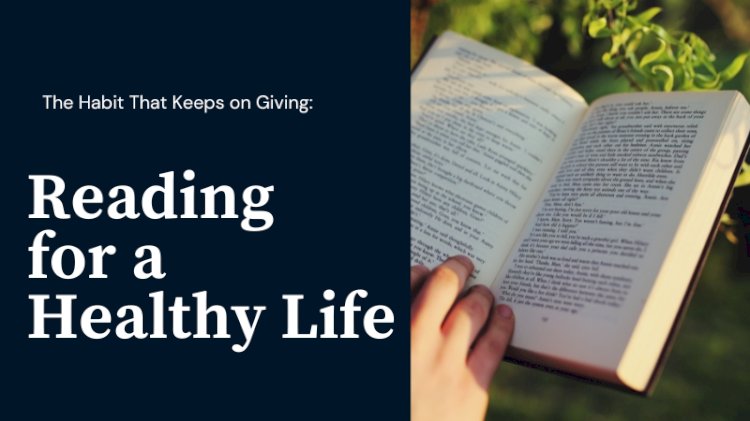The Habit That Keeps on Giving: Reading for a Healthy Life
Embracing the habit of reading is a transformative and timeless practice with numerous benefits for the mind and body. It stimulates mental activity, reduces stress, enhances vocabulary, fosters empathy, and offers a wealth of knowledge. Reading also contributes to better cognitive health, improved sleep, stress management, and enhanced focus. Developing this habit involves setting achievable goals, creating a conducive reading space, establishing routines, and joining book clubs for community support. From childhood to old age, reading offers a lifelong journey of growth and enrichment, making it a valuable habit that anyone can enjoy.
By Shreya Rajvanshi Gangal

In today's fast-paced world, where technology and distractions constantly compete for our attention, the simple act of reading often takes a backseat. However, reading is more than just a pastime; it's a healthy habit that can have profound benefits for both the mind and body. Whether you're a child, a teenager, an adult, or a senior, embracing the habit of reading can bring about positive changes in your life. In this article, we will explore the many advantages of reading, its impact on health and the mind, and provide tips on how to develop this enriching habit.
The Benefits of Reading
- Mental Stimulation: Reading is like a workout for your brain. It stimulates cognitive functions and keeps your mind sharp and active. Engaging with complex plots, diverse characters, and different writing styles challenges your intellect and boosts problem-solving skills.
- Stress Reduction: Escaping into a good book allows you to temporarily leave behind the stresses of everyday life. Reading fiction, in particular, has been shown to reduce stress levels, lower heart rates, and calm the mind.
- Improved Vocabulary and Language Skills: Regular reading exposes you to a vast array of words and phrases, enriching your vocabulary and improving your language skills. This enhanced linguistic ability can be invaluable in both personal and professional contexts.
- Enhanced Empathy: When you read about characters and their experiences, you gain insight into their emotions, thoughts, and struggles. This can foster empathy and help you understand and relate to others better.
- Knowledge Acquisition: Books are a treasure trove of information. Whether you're reading non-fiction or historical novels, you can acquire valuable knowledge on a wide range of topics. Lifelong learning through reading is a rewarding endeavour.
How Reading Affects Health and Mind
- Reduced Cognitive Decline: Studies have shown that individuals who engage in regular reading throughout their lives are less likely to experience cognitive decline as they age. Reading keeps the brain active and may delay the onset of conditions like Alzheimer's disease.
- Better Sleep: Reading before bedtime is a healthier alternative to screen time. The calming ritual of reading can help you relax and fall asleep faster, leading to better sleep quality.
- Stress Management: As mentioned earlier, reading can be an effective stress management tool. It distracts the mind from worries, reduces cortisol levels (the stress hormone), and promotes relaxation.
- Improved Focus and Concentration: In a world filled with distractions, reading requires sustained focus. Regularly practising this skill can improve your ability to concentrate on tasks and enhance productivity.
Developing the Reading Habit
- Set Realistic Goals: Start small. Commit to reading for just 10-15 minutes a day and gradually increase the time as the habit becomes ingrained.
- Create a Reading Space: Designate a comfortable and quiet space where you can read without interruptions.
- Make It a Routine: Incorporate reading into your daily routine, whether it's during your commute, before bedtime, or during breaks.
- Join a Book Club: Participating in a book club can provide motivation and a sense of community, making reading a more enjoyable habit.
Reading at Different Stages of Life
- Children: Reading from a young age enhances language development, creativity, and cognitive skills. Encourage children to explore various genres and discover their interests.
- Teenagers: Reading helps teenagers develop critical thinking skills and expand their horizons. It also provides a healthy escape from the pressures of adolescence.
- Adults: For adults, reading is a lifelong source of knowledge, relaxation, and personal growth. It can foster empathy and improve communication skills.
- Seniors: Reading can be a source of mental stimulation and social connection for seniors. Book clubs and libraries can provide opportunities for social engagement.
Conclusion
In a world inundated with digital distractions, the healthy habit of reading stands as a timeless and transformative practice. Its benefits extend to mental, emotional, and physical well-being, making it a habit worth cultivating at any age. So, grab a book, immerse yourself in its pages, and embark on a journey that promises to enrich your mind and nourish your soul. Your future self will thank you for making reading a part of your daily life.
What's Your Reaction?


















